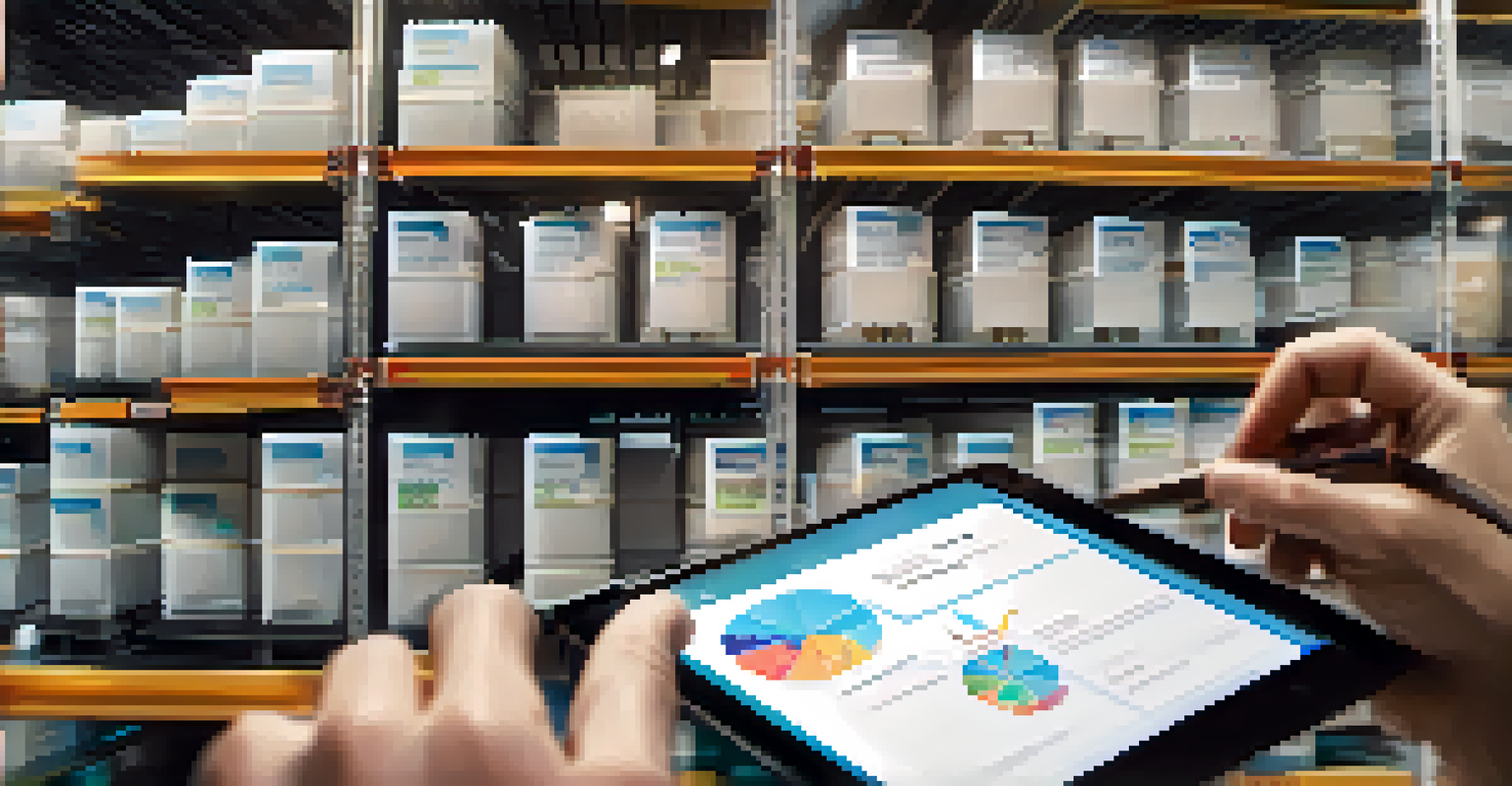The Future of Supply Chains with Cryptocurrency Integration

Understanding Cryptocurrency and Supply Chains
Cryptocurrency is a digital currency that uses cryptography for secure transactions. In the context of supply chains, it offers a new way to facilitate payments and track goods. Imagine a world where payments are instant, transparent, and secure, all thanks to this innovative technology.
Blockchain technology is the backbone of cryptocurrency, providing a secure and transparent way to record transactions.
Supply chains are networks that deliver products from suppliers to consumers. Integrating cryptocurrency could streamline these processes significantly, reducing delays and inefficiencies. It’s like replacing a slow, winding road with a sleek highway that gets goods to their destination faster.
As businesses look for ways to enhance their operations, understanding the synergy between cryptocurrency and supply chains is crucial. This integration could lead to more secure and efficient transactions, benefiting everyone involved.
The Benefits of Cryptocurrency in Supply Chains
One of the standout benefits of cryptocurrency is its ability to provide real-time tracking and transparency. With blockchain technology, every transaction is recorded in a secure, immutable ledger. This means that suppliers and customers can trace their goods at every step, reducing fraud and errors.

Moreover, cryptocurrency can lower transaction costs by removing intermediaries that traditionally handle payments. Think of it as cutting out the middleman in a negotiation, allowing for more direct communication and better deals. This can lead to significant savings for businesses.
Cryptocurrency Enhances Supply Chains
Integrating cryptocurrency can streamline supply chain processes, providing faster transactions and reduced costs.
Additionally, cryptocurrency enables faster transactions, especially in international trade. Instead of waiting days for bank transfers, payments can be completed in minutes. This speed can greatly enhance a company's ability to respond to market changes and customer demands.
Challenges of Integrating Cryptocurrency in Supply Chains
Despite its advantages, integrating cryptocurrency into supply chains isn’t without challenges. One major concern is the volatility of digital currencies, which can fluctuate dramatically in value. This unpredictability can make it difficult for companies to price their goods and manage budgets effectively.
The future of supply chains with cryptocurrency integration looks promising.
There are also regulatory hurdles to navigate, as different countries have varying laws regarding cryptocurrency use. Companies must stay informed about these regulations to avoid legal pitfalls. It’s akin to playing a game where the rules keep changing, requiring players to adapt quickly.
Finally, there’s the need for widespread adoption and understanding of cryptocurrency among all stakeholders. Education and training will be essential to ensure that everyone from suppliers to consumers is comfortable with this new payment method.
Real-World Examples of Cryptocurrency in Supply Chains
Several companies are already exploring cryptocurrency in their supply chains. For instance, major retailers like Overstock have begun accepting Bitcoin for purchases, which allows for faster transactions and lower fees. This is a prime example of how businesses can leverage digital currencies to enhance customer experience.
Another intriguing case is IBM’s Food Trust, which uses blockchain technology to improve food safety and traceability. By integrating cryptocurrency, suppliers can ensure quicker payments, which can lead to fresher produce reaching consumers. It’s like having a direct line from farm to table, ensuring quality and satisfaction.
Blockchain Ensures Transparency
Blockchain technology offers a secure and immutable ledger, enabling real-time tracking and transparency for goods.
These examples highlight the potential for cryptocurrency to reshape supply chains. As more companies experiment with these technologies, we can expect to see innovative solutions that address current inefficiencies.
The Role of Blockchain in Supply Chain Cryptocurrency
Blockchain technology is the backbone of cryptocurrency, providing a secure and transparent way to record transactions. In supply chains, this means that every step of the process is documented, making it easier to track goods and confirm their authenticity. Imagine having a digital fingerprint for each product that travels through the supply chain.
Additionally, blockchain can automate many supply chain processes through smart contracts. These are self-executing contracts with the terms of the agreement written directly into code. This automation can significantly reduce administrative burdens, allowing teams to focus on more strategic tasks.
As blockchain technology continues to evolve, its integration with cryptocurrency will likely lead to even more innovative solutions in supply chains. This partnership can create a more resilient system that adapts to the complexities of modern commerce.
Future Trends in Cryptocurrency and Supply Chains
Looking ahead, we can expect to see an increase in the adoption of cryptocurrency in supply chains. As more businesses recognize its benefits, from cost savings to faster transactions, the momentum will continue to build. It’s similar to the way smartphones transformed communication—once the advantages became clear, adoption skyrocketed.
Moreover, advancements in technology will likely lead to new cryptocurrency solutions tailored specifically for supply chain needs. This could include digital currencies with built-in features for tracking and compliance, making it easier for companies to integrate them into their existing systems.
Challenges of Adoption Persist
Despite its advantages, companies face hurdles such as volatility, regulatory issues, and the need for widespread understanding of cryptocurrency.
In the coming years, we might also see greater collaboration between companies and cryptocurrency platforms. This collaboration could foster innovation, creating a more efficient and transparent supply chain ecosystem that benefits everyone involved.
Preparing for Cryptocurrency Integration in Supply Chains
For companies considering cryptocurrency integration, preparation is key. This starts with educating teams about the benefits and challenges of using digital currencies in supply chains. Think of it as laying a solid foundation before building a house—without it, the structure may crumble.
Next, businesses should assess their current supply chain processes to identify areas where cryptocurrency can add value. This could involve analyzing transaction times, costs, and security measures. By pinpointing specific pain points, companies can make informed decisions about where to implement changes.

Lastly, it’s essential to stay updated on the latest developments in cryptocurrency and blockchain technology. As this landscape evolves, being agile and adaptable will be crucial for success. Companies that embrace these changes will position themselves as leaders in the future of supply chains.
Conclusion: Embracing the Future of Supply Chains
The integration of cryptocurrency into supply chains presents both exciting opportunities and significant challenges. As we’ve explored, the potential benefits, from enhanced transparency to reduced costs, are compelling. However, companies must also navigate the complexities of adoption and regulation.
Ultimately, businesses that take a proactive approach to understanding and implementing cryptocurrency will likely thrive in the evolving landscape. By embracing this technology, they can create more resilient, efficient, and responsive supply chains that meet the demands of modern consumers.
In conclusion, the future of supply chains with cryptocurrency integration looks promising. As more organizations explore this avenue, we can expect to see a transformation that not only improves business operations but also enhances the overall customer experience.